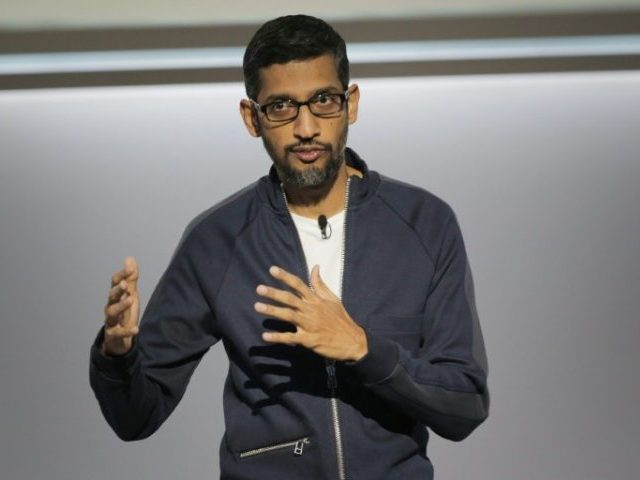Axios, a news website funded by venture capitalists who also invest in the tech industry, ran an article casting doubt on concerns about political bias on the part of Google following the congressional testimony of its CEO, Sundar Pichai.
Instead of focusing on the testimony of Pichai, chief executive of a monopolistic tech giant and the world’s second most valuable company, Axios instead opted to scrutinize Pichai’s scrutinizers.
Axios offers a point-by-point analysis of issues raised by Republicans on the House Judiciary Committee, which questioned the Google CEO earlier today.
But many of these “rebuttals” were just unsubstantiated disagreements. For example, one of Axios’ “counterpoints” to Republicans raising the findings of Dr. Robert Epstein, the psychologist studying the effect of search engines on election outcomes, is that “Google has disputed the study and insists that it does not rank search results in order to influence election outcomes.”
For another “counterpoint,” Axios quotes three out of twelve academics (a one-quarter minority) who said they were “uncertain about the sources of bias.”
The final Axios-endorsed counterpoint against Epstein’s study was the opinion of a single academic.
“One academic quoted by the Post suggested that some of the bias the study found could be coming from users themselves, not Google.”
None of the counterpoints addressed the substance of Epstein’s work, which is that search engine manipulation — whether Google is engaged in it or not — can cause double-digit swings in voter preferences.
Rep. Goodlatte, who raised the study, also did not focus on allegations that Google actually manipulated search results, but rather on the fact that they are capable of doing so.
This is a problem in itself, given that there is currently no official oversight or monitoring system that could detect deliberate manipulation on the part of the tech giant.
The problem isn’t that Google is manipulating elections. It’s that even if they aren’t, they could be, and we wouldn’t know about it. Google is subject to no official oversight, monitoring, or transparency requirements designed to prevent political search engine manipulation.
As for actual evidence of political bias beyond Google’s search product, there’s plenty — from Google’s leaked internal briefing that claims the company “shifted towards censorship” partly in response to political events, to leaked emails showing that the tech giant’s director of monetization made Breitbart News an area of focus in the company’s efforts against “fake news,” to more leaked emails showing the company used its features to turn out Latino voters in “key states” in 2016.
Even Pichai acknowledged that the latter would constitute partisan behavior — which is why he also brazenly denied it, despite the existence of emails from his own head of Multicultural Marketing proving his statements wrong.
The clearest example of a politically biased Google policy? It’s prioritization of Wikipedia articles in search results and underneath YouTube videos. The latter in particular is a conscious decision on the part of the company to use a highly biased left-wing source to inform its users.
Nevertheless, Axios maintains that “no credible evidence has been presented that suggests Google engineers program the company’s search, video or news algorithms to favor one political ideology over another.”
Axios was set up with backing from big tech royalty, including Steve Jobs’ widow and heir, and the venture capital firm Lerer Hippeau, which also invested in tech companies Venmo and Giphy.
Allum Bokhari is the senior technology correspondent at Breitbart News. You can follow him on Twitter, Gab.ai and add him on Facebook. Email tips and suggestions to allumbokhari@protonmail.com.

COMMENTS
Please let us know if you're having issues with commenting.